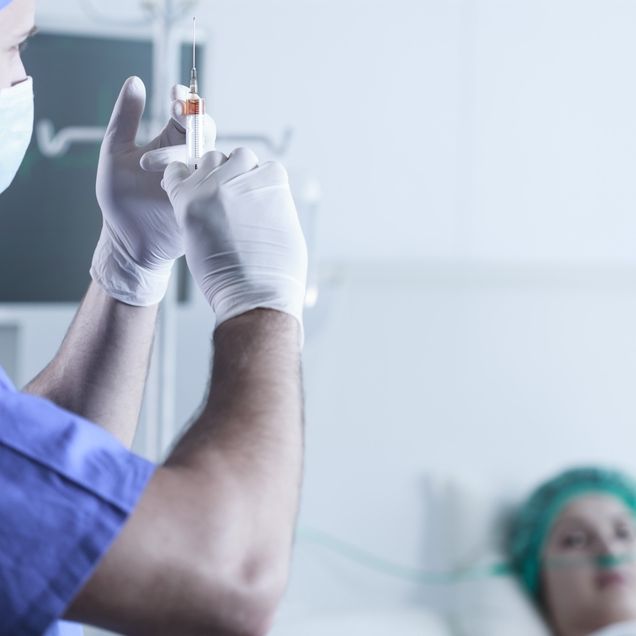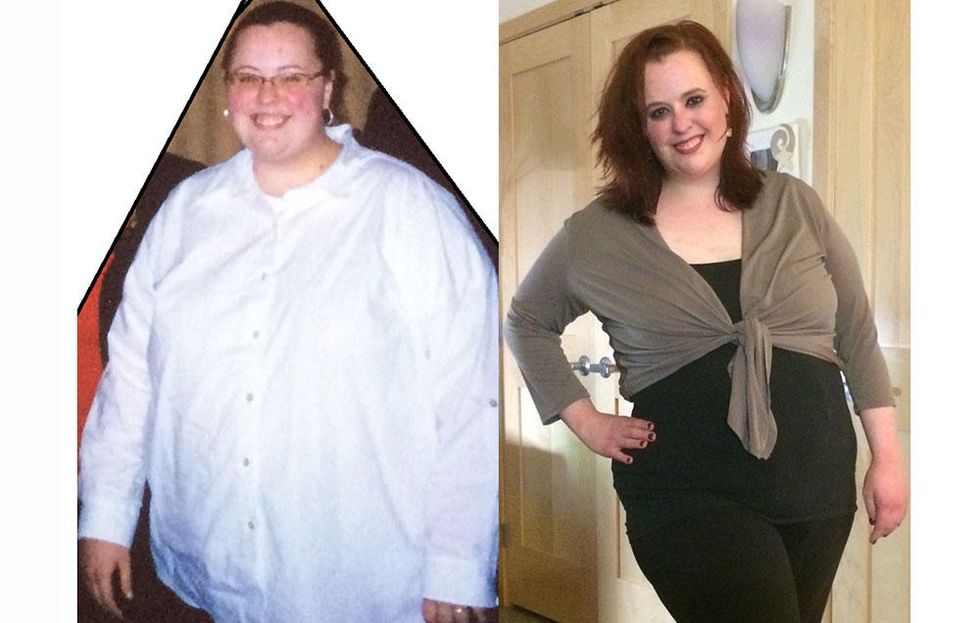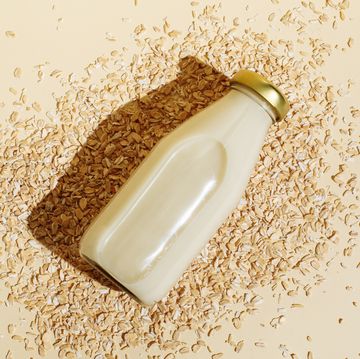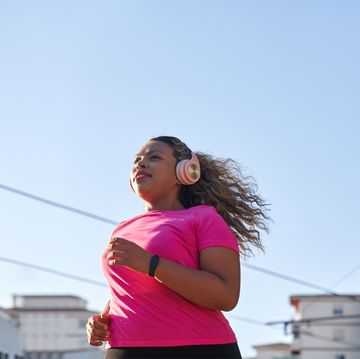This article was written by Katie Pritchard as told to Aviva Patz and provided by our partners at Prevention.
After her gastric bypass surgery at age 22, Katie Pritchard became an alcoholic and a drug addict, and says she lost sight of who she really wanted to be. If she could go back in time, she's not sure she would have had the surgery. This is her story.
It's not that there were medical complications—more like emotional complications. You're supposed to undergo psychotherapy before and after gastric bypass surgery, but I didn't do that. And I desperately needed to. I've suffered from mental illness all of my life. My childhood was full of abuse, trauma, and bullying by my peers, my brother, and my own dad. Gaining weight early, being insecure, and having poor social skills made me an easy target. Every day I got called things like "you ugly fat ass" and "you worthless pile of shit," and I never had positive affirmations and validation, especially in the looks department.
RELATED: 8 Things You Need To Know About Weight Loss Surgery
I tried to lose weight many times. I tried Atkins, the South Beach diet, veggies and fruit, you name it, but nothing ever worked. The depression and anxiety were so debilitating that I had no motivation to give it my all. I felt hopeless.
The bariatric surgery did help me drop pounds—146, to be exact. But it didn't solve my problems. It actually made them worse. After I began losing weight, men started telling me I was "pretty" (even calling me "hot" and "stunning"). I became promiscuous, wild, and irresponsible. I was finally getting the attention I craved and the love I wanted. I did anything to keep that attention and prove to everyone who treated me poorly, "See! I am worth something! I'm not worthless! I'm not fat and ugly! I'm stunning! I'm beautiful!"
What I didn't realize was that I was giving sex to get love, while the men I dated were giving love to get sex. And even as they lavished attention on me, my identity and self-worth remained firmly rooted in the toxic soil of pain, heartache, and loss. I may have looked pretty on the outside, but on the inside, I was still ugly from the damage, abuse, and trauma from my childhood. I still felt worthless.
I was an alcoholic, a drug addict, extremely mentally ill, unemployed, bankrupt, single, and homeless.
I went on dates and began drinking. Eventually, I would show up early to the dates to drink, stay after to drink, or go out and drink when I had no dates at all. I became addicted to painkillers after the surgery, as well. Long after the pain was gone, the recreational high was irresistible.
RELATED: 6 Sneaky Signs You Drink Too Much
At the time of my operation, I was 274 pounds (size 24/26). I went down to 127 pounds (size 6/8) in a year. But over the next five years, my drinking and drug use put back 100 of the 146 pounds that I had lost.
I hit rock bottom five years after the surgery. I was an alcoholic, a drug addict, extremely mentally ill, unemployed, bankrupt, single, and homeless. I cut my wrists to try to kill myself—I was very, very drunk at the time and didn't care if I lived or died. I did it in the kitchen of the house I used to share with my ex-boyfriend. We had a three-tiered garden with a fountain in the back of the house. I remember holding my arm up in the moonlight in the kitchen after I slit my wrists and watching the blood drip down my arm. I remember thinking how pretty it looked, and I felt a strange peace come over me. My ex-boyfriend and his new girlfriend called 911. I refused to go to the hospital, but the paramedics said I had no choice.
A week later, I got arrested for driving while intoxicated. Having handcuffs around my slashed wrists was the last straw. I'm a Christian—that's an important part of my life—and I believe it was God's way of saying, "She's had enough. She's been through everything she needs to go through."
RELATED: 10 Silent Signals You're Way Too Stressed
I started getting better mainly because I finally wanted to. But also for a practical reason: The treatment centers at the homeless shelter where I was staying—the Union Gospel Mission Homeless Shelter for Women—prohibited alcohol and drug abuse, so I would have gotten kicked out if I'd continued using. That rule, and the shelter's amazing classes and counseling, are in large part what helped me get back on my feet.
Having handcuffs around my slashed wrists was the last straw.
I returned to school for the last semester—I'd been working on my college degree for 10 years—and finally graduated. At that point, I had an opportunity to get my own apartment, where I now live with two kittens, Patrick and Maddie. I have been in therapy and receiving mental health treatment with the same providers for almost two years, and they have been an absolute miracle in my recovery and healing.
RELATED: 8 Things That Happen When You Finally Stop Drinking Diet Soda
Ten years later, I'm losing weight on my terms: through ballroom dancing, which is a passion I've had for years and never had a chance to pursue. I also gave up Mountain Dew and fast food. I've lost 31 pounds since January.
For many people, bariatric surgery is a lifesaver. For me, it just deepened my heartache, increased the number of memories I wish I could forget, and broadened the spectrum of the people I had to forgive—including myself. I needed time, therapy, processing, forgiveness, acceptance, and my relationship with God to do the deeper healing that has gotten me to the place I am today.
On April 28, I will be two years sober, and I'm entirely, completely, and utterly happier and more content than I've ever been.














